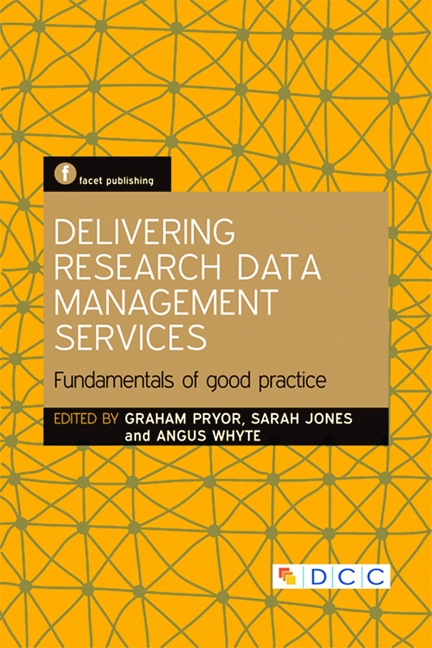Book contents
- Frontmatter
- Contents
- Preface
- Contributors
- 1 A patchwork of change
- 2 Options and approaches to RDM service provision
- 3 Who's doing data? A spectrum of roles, responsibilities and competences
- 4 A pathway to sustainable research data services: from scoping to sustainability
- 5 The range and components of RDM infrastructure and services
- 6 Case study 1: Johns Hopkins University Data Management Services
- 7 Case study 2: University of Southampton – a partnership approach to research data management
- 8 Case study 3: Monash University, a strategic approach
- 9 Case study 4: a national solution – the UK Data Service
- 10 Case study 5: development of institutional RDM services by projects in the Jisc Managing Research Data programmes
- Index
6 - Case study 1: Johns Hopkins University Data Management Services
Published online by Cambridge University Press: 08 June 2018
- Frontmatter
- Contents
- Preface
- Contributors
- 1 A patchwork of change
- 2 Options and approaches to RDM service provision
- 3 Who's doing data? A spectrum of roles, responsibilities and competences
- 4 A pathway to sustainable research data services: from scoping to sustainability
- 5 The range and components of RDM infrastructure and services
- 6 Case study 1: Johns Hopkins University Data Management Services
- 7 Case study 2: University of Southampton – a partnership approach to research data management
- 8 Case study 3: Monash University, a strategic approach
- 9 Case study 4: a national solution – the UK Data Service
- 10 Case study 5: development of institutional RDM services by projects in the Jisc Managing Research Data programmes
- Index
Summary
Introduction
This case study describes the development of the Johns Hopkins University Data Management Services (JHUDMS), with an emphasis on lessons learned. While many individuals – noting that only some of them are mentioned in this chapter – are responsible for the development of JHUDMS, this account is written in a chronological sense from the perspective of the individual who was involved in every aspect of the development. Every effort has been made to describe this case study accurately but any errors in understanding or recollection are solely the author's.
The launch of JHUDMS represented the culmination of over a decade of research and development, prototyping, needs assessment, capacity building and sustainability planning. Beginning with the archiving and preservation of the Sloan Digital Sky Survey (SDSS) and advancing through the work of the Data Conservancy, described in section 3, the Sheridan Libraries at Johns Hopkins University (JHU) developed substantial expertise and initial infrastructure for data management that contributed directly to the development of the JHUDMS.
Fundamentally, the JHUDMS represents an important step in an overall, longterm data infrastructure development programme led by the Sheridan Libraries. The Sheridan Libraries at JHU include two unique departments–an R&D group known as the Digital Research and Curation Center and a business unit known as the Entrepreneurial Library Program – that were instrumental in the development of JHUDMS. However, several lessons that were learned should be applicable or useful to other institutions as they plan for and implement research data management services.
The origins of the data management program at JHU can be traced back to an initial exchange between two individuals. Professor Alexander Szalay (Department of Physics and Astronomy at JHU) was the principal investigator for the ‘National Virtual Observatory’ award from the US National Science Foundation. Shortly after the announcement of the award, I contacted Szalay to inquire about their data management plans. This seemingly simple exchange led to a longterm collaboration that has greatly influenced the data management program at JHU. While systematic and organizational approaches are essential for comprehensive, sustainable data management services, JHU's experience provides evidence regarding the importance of individuals in initiating appropriate dialogue. Institutions seeking to develop research data management services might consider identifying a faculty champion who can advocate its importance and an administrator who can appreciate and channel this faculty champion's viewpoint.
- Type
- Chapter
- Information
- Delivering Research Data Management ServicesFundamentals of Good Practice, pp. 115 - 134Publisher: FacetPrint publication year: 2013



